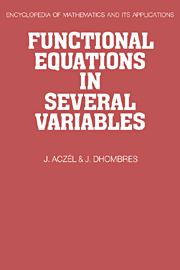Book contents
- Frontmatter
- Contents
- Dedication
- Preface
- Further information
- 1 Axiomatic motivation of vector addition
- 2 Cauchy's equation. Hamel basis
- 3 Three further Cauchy equations. An application to information theory
- 4 Generalizations of Cauchy's equations to several multiplace vector and matrix functions. An application to geometric objects
- 5 Cauchy's equations for complex functions. Applications to harmonic analysis and to information measures
- 6 Conditional Cauchy equations. An application to geometry and a characterization of the Heaviside functions
- 7 Addundancy, extensions, quasi-extensions and extensions almost everywhere. Applications to harmonic analysis and to rational decision making
- 8 D'Alembert's functional equation. An application to noneuclidean mechanics
- 9 Images of sets and functional equations. Applications to relativity theory and to additive functions bounded on particular sets
- 10 Some applications of functional equations in functional analysis, in the geometry of Banach spaces and in valuation theory
- 11 Characterizations of inner product spaces. An application to gas dynamics
- 12 Some related equations and systems of equations. Applications to combinatorics and Markov processes
- 13 Equations for trigonometric and similar functions
- 14 A class of equations generalizing d'Alembert and Cauchy Pexider-type equations
- 15 A further generalization of Pexider's equation. A uniqueness theorem. An application to mean values
- 16 More about conditional Cauchy equations. Applications to additive number theoretical functions and to coding theory
- 17 Mean values, mediality and self-distributivity
- 18 Generalized mediality. Connection to webs and nomograms
- 19 Further composite equations. An application to averaging theory
- 20 Homogeneity and some generalizations. Applications to economics
- 21 Historical notes
- Notations and symbols
- Hints to selected ‘exercises and further results’
- Bibliography
- Author index
- Subject index
16 - More about conditional Cauchy equations. Applications to additive number theoretical functions and to coding theory
Published online by Cambridge University Press: 05 November 2011
- Frontmatter
- Contents
- Dedication
- Preface
- Further information
- 1 Axiomatic motivation of vector addition
- 2 Cauchy's equation. Hamel basis
- 3 Three further Cauchy equations. An application to information theory
- 4 Generalizations of Cauchy's equations to several multiplace vector and matrix functions. An application to geometric objects
- 5 Cauchy's equations for complex functions. Applications to harmonic analysis and to information measures
- 6 Conditional Cauchy equations. An application to geometry and a characterization of the Heaviside functions
- 7 Addundancy, extensions, quasi-extensions and extensions almost everywhere. Applications to harmonic analysis and to rational decision making
- 8 D'Alembert's functional equation. An application to noneuclidean mechanics
- 9 Images of sets and functional equations. Applications to relativity theory and to additive functions bounded on particular sets
- 10 Some applications of functional equations in functional analysis, in the geometry of Banach spaces and in valuation theory
- 11 Characterizations of inner product spaces. An application to gas dynamics
- 12 Some related equations and systems of equations. Applications to combinatorics and Markov processes
- 13 Equations for trigonometric and similar functions
- 14 A class of equations generalizing d'Alembert and Cauchy Pexider-type equations
- 15 A further generalization of Pexider's equation. A uniqueness theorem. An application to mean values
- 16 More about conditional Cauchy equations. Applications to additive number theoretical functions and to coding theory
- 17 Mean values, mediality and self-distributivity
- 18 Generalized mediality. Connection to webs and nomograms
- 19 Further composite equations. An application to averaging theory
- 20 Homogeneity and some generalizations. Applications to economics
- 21 Historical notes
- Notations and symbols
- Hints to selected ‘exercises and further results’
- Bibliography
- Author index
- Subject index
Summary
This chapter is entirely devoted to conditional Cauchy equations which were introduced in Chapter 6 and already studied in Chapter 7. In the first section, by using a fixed point theorem and also the order structure of ℝ, and by adding a strong regularity condition on the unknown function, we deduce the addundancy of some conditions on rather thin sets. In the second and third sections, we use group decomposition and then proceed to an application to additive number theory. An analogous equation in the fourth section yields an application to information theory, for mean codeword lengths. In the two last sections, we come back to additive number theory, proving the basic result that logarithms are the only monotonic functions defined on integers which transform a product into a sum. We extend this and similar results in various ways.
Expansions of the Cauchy equation from curves
Thus far, for conditional Cauchy equations, we have been dealing with rather ‘large’ subsets Z (see Chapters 6 and 7). Under some additional regularity assumptions on f, we may proceed to far smaller Z. A typical result can be obtained in the plane by using for Z some curve (Dhombres 1979, pp. 3.32–3.37). We recall from Section 7.1 that Z ⊂ ℝ2 is addundant in a class of functions if the restriction of the Cauchy equation from ℝ2 to Z changes neither the domain nor the form of its general solution in the class.
- Type
- Chapter
- Information
- Functional Equations in Several Variables , pp. 254 - 286Publisher: Cambridge University PressPrint publication year: 1989



